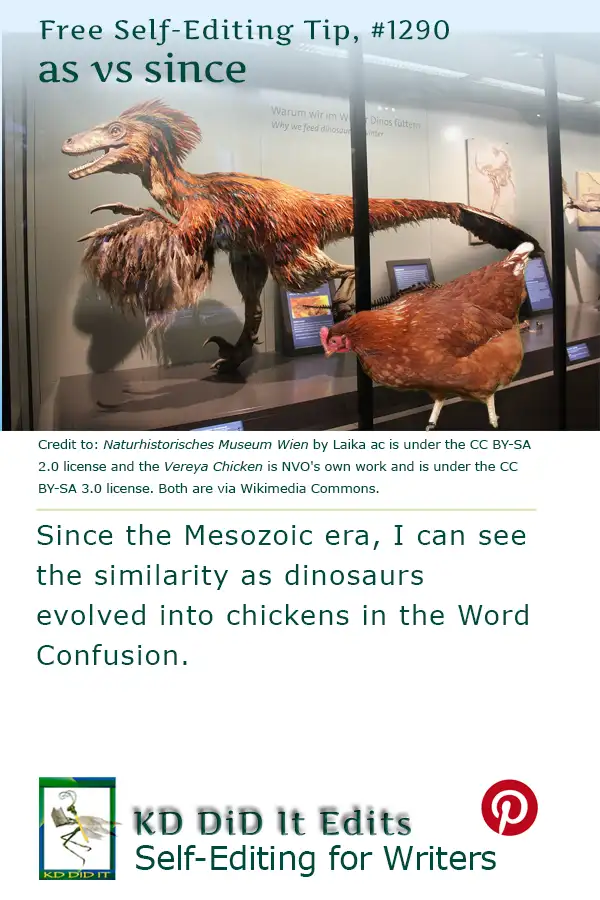In this Word Confusion as versus since, both are adverbs, causal conjunctions, and prepositions.
As causal conjunctions, as and since introduce a subordinate clause, but slightly less strong when connecting a reason to a result in a sentence. Both are also more formal than because.
Their form is as/since + subject + verb.
While as and since are used to center on the result, it does not mean you can use them in the same way. Their purpose may be similar, but they are not identical.
As
The usual meaning of as is while (being in the present) — and most grammarians prefer writers keep to the time sense of as and not in its causal sense.
As marks time: “We had dessert as we watched TV.”
As marks causation: “We had dessert, as we had ice cream in the house.”
As causation, you could also use because: “We had dessert because we had ice cream in the house.”
“In the causal sense, as should generally be avoided (because not as!) it may be understood as having its more usual meaning while, especially when it is placed anywhere but at the beginning of the sentence” (Garner).
Since
Since is more precise when it is used to refer only to a point in time in the past (after, elapsed time), although it also can be used to give the reason for something.
Since he was ill, he stayed home.
Since I started my new job, I have been really happy.
Since we moved to this new house, I feel more relaxed.
Since is normally used with perfect tenses: present perfect, present perfect progressive/continuous, past perfect, past perfect progressive/continuous, future perfect, and/or future perfect progressive/continuous
He has been here since 9am.
He has been working since he arrived.
I had lived in New York since my childhood.
They‘ve lived in Oxford since 2004.
Since also tells you why someone does something while because is all about by cause of.
We had dessert since he had bought ice cream.
They weren’t sure what they would have for dessert, but then he bought ice cream.
Because he bought ice cream, they had dessert.
They weren’t going to have dessert, but then he bought ice cream.
Grammarians are incensed when people confuse since with because, but it’s primarily their issue. However, if you find that there is some ambiguity and your sentence might be misinterpreted like the above examples, try rewording it so there’s no room for misunderstanding.
Exploring Later . . .
You may also want to explore “Nope, It’s Not As You Like It“, “As versus Because“, “As versus For“, “As versus That“, and/or “As versus Whether“.
You may also be interested in “Sense versus Since“.
Word Confusions . . .
. . . started as my way of dealing with a professional frustration with properly spelled words that were out of context in manuscripts I was editing as well as books I was reviewing. It evolved into a sharing of information with y’all. I’m hoping you’ll share with us words that have been a bête noire for you from either end.
If you found this post on “As versus Since” interesting, consider ubscribing to KD Did It, if you’d like to track this post for future updates.
| As | Since |
|---|---|

Children Holding Ice Cream Cones While Looking at the Screen of a Tablet by Tima Miroshnichenko is in the public domain, via Pexels. — Or, it could read as “Children Holding Ice Cream Cones As They Look at the Screen of a Tablet”. |

Losers Since 67 by Christine K is under the CC BY-ND 2.0 license, via Flickr. |
| Part of Grammar: | |
| Adverb; Conjunction, causal; Preposition | Adverb; Conjunction, causal; Preposition |
| Check the Punctuation page for information on comma usage for: | |
| as | since |
| Adverb: [Usually as . . . as] Used in comparisons to refer to the extent or degree of something
Conjunction, causal: Used to indicate by comparison the way that something happens or is done
Because
Even though Preposition: During the time of being (the thing specified) |
Adverb: Between then and now Ago Conjunction, causal: For the reason that
Preposition: |
| Examples: | |
| Adverb: It tasted like grape juice but not as sweet. She smiled as she was eating her favorite meal. As means while in this instance, which can mean the above sentence could be confusing: Did she smile while she was eating her favorite meal or because she was eating her favorite meal? As many as twenty-two rare species may be at risk. She kissed him goodbye, as usual. Conjunction, causal: As I have an appointment this afternoon, I won’t be available to work. As she grew older, she kept more to herself. They can do as they wish. Dress as you would if you were having guests. As in the past, a collection is to be taken. As you can see, I didn’t go after all. He has, as you know, called for a referendum. I must stop now as I have to go out. Sweet as he is, he doesn’t pay his bills. Try as he might, he failed to pull it off. Preposition: He got a job as a cook. They were treated as foreigners. As a dairy producer, you should evaluate and analyze your farm from many viewpoints. He had often been sick as a child. As a student, my nickname was Space. |
Adverb: She ran away on Friday and we haven’t seen her since. The couple divorced in 2012 and he has since remarried. The settlement had vanished long since. He’s been in a good mood since he quit his job. This use of since could be confusing, as the above sentence could mean ““He’s been in a good mood from the moment he quit his job up until the present time” OR because may be a better choice, as that would indicate that “He’s been in a good mood because he quit his job.” Conjunction, causal: I’ve felt better since I’ve been here. Ever since the film hit cinemas in 1996, fans have been wondering whether a sequel would finally get the go-ahead. Delegates were delighted, since better protection of rhino reserves will help protect other rare species. Preposition: A lot has changed in the industry since then. This is the worst property slump since the war. |
| History of the Word: | |
| Middle English as a reduced form of the Old English alswā meaning similarly. | Late Middle English contraction of the obsolete sithence, or from dialect sin (both from dialect sithen meaning thereupon, afterward, ever since. |
C’mon, get it out of your system, bitch, whine, moan . . . which words are your pet peeves? Also, please note that I try to be as accurate as I can, but mistakes happen or I miss something. Email me if you find errors, so I can fix them . . . and we’ll all benefit!
Satisfy your curiosity about other Word Confusions on its homepage or more generally explore the index of self-editing posts. You may also want to explore Book Layout & Formatting Ideas, Building Your Website, Formatting Tips, Grammar Explanations, Linguistics, Marketing Help & Resources, Publishing Tips, the Properly Punctuated, and/or Writing Ideas and Resources.
Resources for As versus Since
Some of these links may be affiliate links, and I will earn a small percentage, if you should buy it. It does not affect the price you pay.
Garner, Bryan. Garner’s Modern English Usage , 4th ed. Oxford University Press, 2016. <https://amzn.to/4bPN48D>. Ebook.
Khurana, Anjali. “English Grammar: What part of speech is ‘as’?” Quora. 2012. Accessed n.d. <http://www.quora.com/Grammar/What-part-of-speech-is-as>.
“Like and As.” English for Students. n.d. Web. 28 May 2012. <http://www.english-for-students.com/Like-and-As.html>.
“‘Since’ vs. ‘As’ vs. ‘Because’.” Merriam-Webster. n.d. Accessed 4 June 2024. <https://www.merriam-webster.com/grammar/since-as-because-usage>.
Straus, Jane. “Tackling More Tricky Word Choices: As, Because, and Since.” Grammar Book.com. n.d. Web. 6 May 2021. <https://www.grammarbook.com/blog/effective-writing/tackling-more-tricky-word-choices-as-because-and-since/>.
Pinterest Photo Credits
Naturhistorisches Museum Wien by Laika ac is under the CC BY-SA 2.0 license and the Vereya chicken is NVO‘s own work and is under the CC BY-SA 3.0 license. Both are via Wikimedia Commons.


